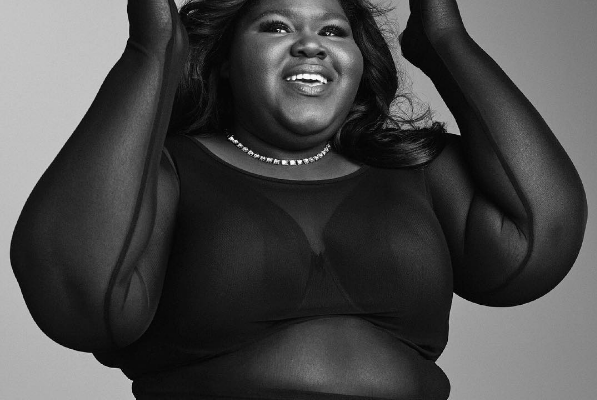You cannot purchase empowerment or self-love, and you certainly can’t purchase liberation.
Because the internet is on the verge of becoming self-aware and it knows everything we do, my social media pages are being inundated with the newest Lane Bryant ad. In it, plus-size models and actresses like Gabourey Sidibe and Ashley Graham pose in lingerie and deliver snappy comebacks to nasty comments about their bodies. It’s a celebration of body love and, um, moderately priced underwear for curvy girls. They’re on to me; I’m a plus-sized lady and I like clothes. But they’re also about a million miles off base, because there is little I hate more than brands hijacking body positivity to sell me outfits.
“Body positivity” is the watered-down version of what was called “fat activism” a few years ago—a movement to fight the oppression that people, particularly women and femmes, face when their bodies deviate from the mainstream beauty standard. The problem is, what started as a movement of fat people claiming visibility and fighting discrimination in areas like health care and employment has been usurped and made mainstream to the point that today, when you say “body positivity,” it’s hard to remember that we’re talking about oppression at all. Instead, it’s become a catch-all phrase for pseudo-inspiring “love yourself” messages that elide the fact that low self-esteem doesn’t just happen; it’s instilled in us by a misogynistic, capitalist, image-obsessed society.
There is radical body positivity out there, in the work of people like activist Sonya Renee Taylor, who founded the website and self-love movement The Body Is Not An Apology. TBINAA investigates the connections between various forms of what Taylor calls “body terrorism,” which range from fat antagonism to racism, transphobia, ableism, and toxic masculinity. This is a truly intersectional approach that envisions and works toward a world where no one is oppressed because of the body they inhabit—a goal that can only be achieved through action, not by buying the right brand of shapewear.
Lane Bryant—and every other company that commodifies the rhetoric of body love, from Dove to Pantene to H&M—is not actually offering freedom from the paradigm that ties women’s worth to their appearance. They’re just telling fat women “you, too, can be beautiful and valuable, as long as you wear our clothes (and are femme, cis, and able-bodied).” That’s not radical. That’s seeking a broader audience for the same old song and dance—one that harms everyone, even those who fit into its exacting guidelines. Conventionally attractive women have historically been objectified, portrayed as shallow, and undervalued for anything they contribute beyond their appearances. How exactly does fitting into that category constitute empowerment for plus-size women?
Look, of course everyone deserves to feel gorgeous and confident and badass. And I’m not going to pretend I’m above the impulse to spend money on clothes that boost my spirits. After my grandfather died last month, I’m pretty sure that buying a pair of Lisa Frank lipstick-print leggings did more for my mood than any amount of long walks, bubble baths, or pouring my heart out in my journal. But it’s important to understand that this is a placebo. You cannot purchase empowerment or self-love, and you certainly can’t purchase liberation. A hot outfit is no substitute for the real, sustained, shared effort it will take to undermine the tyranny of restrictive beauty standards, sexual objectification, and misogyny.
Instead of brand-name “body positivity” that offers plus-size women an opportunity to spend money making ourselves lovable, a genuine feminist movement for body love would acknowledge that we deserve to be loved, listened to, represented, and valued whether we’re clad in designer jeans or thrift store pajamas. If, as Lane Bryant’s tag line asserts, “this body is made to shine,” it’s going to do that no matter what you’re wearing. No matter whether you bothered to shave your legs or put on makeup. No matter whether you have perfect hair. Essentially, this commercial suggests that fat women can be just as decorative as thin women, and while that statement isn’t necessarily wrong, I think we can do so much more than that.
I’m not mad at Lane Bryant for trying to make a living. We’re all living under capitalism and you gotta do what you gotta do. But it chafes my fat ass to see them trying to package their clothes in the language of feminism. The real revolution comes from the understanding that you have worth no matter what you look like or what you’re wearing. I’d like it if brands would stop trying to sell me self-esteem. I’ve got plenty, thanks. All I need from you is a couple pairs of pants, and maybe, while you’re at it, a decent swimsuit with an underwire.
I am tired of the commodification of self-love. Loving each other, standing up and fighting for each other, advocating for the rights of every body to be seen and valued and protected, is what real body positivity means. And you can’t buy that shit at the mall.
Lindsay King-Miller is a queer femme who does not have an indoor voice. Her writing has appeared in Bitch Magazine, Cosmopolitan.com, Buzzfeed, The Hairpin, and numerous other publications. She lives in Denver with her partner, a really cute baby, and two very spoiled cats. She is the author of Ask A Queer Chick (Plume, 2016).
Other Links:

